Marriage & Family Therapy News
Welcome Class of 2025!
Falk College welcomes the Class of 2025, a talented group from 37 states and 33 global countries. The Class of 2025 includes 373 first-year students, 13 transfer students, 163 new graduate students, and 156 new online graduate students. Fall 2021 Syracuse Welcome is scheduled for Aug. 26-29, 2021, with new student move-in beginning Tuesday, Aug. 24, 2021. The entire welcome week schedule for new students can be found by visiting the Syracuse Welcome website.
Falk College Syracuse Welcome Events:
Falk College Welcomes New Academic Department Chairs 2021-22
As preparations continue for the start of the 2021-22 academic year, Falk College welcomes two new academic department chairs.
- Dyane Watson, Chair, Department of Marriage and Family Therapy
Dyane Watson, Professor of Practice, began her service as Chair of the Department of Marriage and Family Therapy in July 2021. Her areas of research include the adult couple relationship, the influence of marginalization and oppression on couple and family relationships, therapeutic outcomes for children and families, mental health training and service delivery for veterans and military families, and training program evaluation for mental health professionals.
Falk College thanks Thom deLara, Professor of Practice, who served in this role since 2007. During his time as Chair of the Department of Marriage and Family Therapy, he oversaw the expansion of the department and reengineered the curriculum to specifically meet the needs of children, and of those suffering from trauma across the life cycle. In addition, under his direction the department committed itself to educating students, and mental health practitioners, about trauma-informed care as an integral part of evidenced-based clinical practice. In recent years, his curriculum priorities included the development of a nationally recognized clinical program for educating and training mental health providers to work with veterans and military families and the development and implementation of Falk College’s online Marriage and Family Therapy M.A. degree program.
- Lynn Brann, Chair, Department of Nutrition and Food Studies
Lynn Brann, Associate Professor, will begin her service as Chair of the Department of Nutrition and Food Studies in January 2022. Her research interests include the examination of dietary intake and diet quality of children and adolescents related to growth, development, and health, as well as mindful eating to improve self-regulation in children. She is involved in a research collaboration with a colleague in Public Health examining the environmental toxicants, race, and cardiovascular disease risk in children.
Falk College thanks Rick Welsh, Falk Family Endowed Professor, who has served in this role since 2014 and will conclude his service in December 2021. During his time as Chair, food studies, nutrition science and dietetics programs experienced growth and continuation of excellence in research and internships, as well as a range of study abroad experiences. Food studies curriculum development maintained the program’s focus on social, cultural, political, economic, and environmental dimensions of the global food system. Nutrition curriculum elevated nutrition’s integral connections to public health, medicine, and policy. Under Welsh’s leadership, the two programs have continued to develop and strengthen interdisciplinary research and practice and prepare students to meet emerging trends in both professional fields.
Falk College department chairs continuing their service this year are:
- Keith DeRuisseau, Chair, Department of Exercise Science
- Eunjoo Jung, Chair, Department of Human Development and Family Science
- Lutchmie Narine, Chair, Department of Public Health
- Carrie Smith, Chair, School of Social Work
- Michael Veley, Chair, Department of Sport Management
For more information about Falk College academic programs, please visit Falk.syr.edu.
June PTSD Awareness Month
Falk College, National Science Foundation(NSF) REU Program Host Discussion Series for PTSD Awareness Month in June
To educate the local community about issues related to Posttraumatic Stress Disorder (PTSD), Syracuse University’s Falk College, is offering a discussion series during the month of June, which is designated as National PTSD Awareness Month. PTSD is a psychiatric disorder that can occur following the experience or witnessing of life-threatening events, such as military combat, natural disasters, terrorist incidents, serious accidents, or physical or sexual assault.
The discussion series to raise public awareness of PTSD and its effective treatments is free and open to the public. It takes place in conjunction with the Trauma Research Education for Undergraduates program, a joint effort by Syracuse University, SUNY Upstate Medical University and SUNY Oswego to improve access to research experiences for groups typically underrepresented in research.
The project, “Training Diverse Undergraduate Teams of Veterans and Non-Veterans to Conduct Trauma Research with Veterans,” is directed by Brooks B. Gump, Falk Family Endowed Professor of Public Health and co-directed by Professor Karen Wolford, who also coordinates the interdisciplinary graduate certificate program in trauma studies at SUNY Oswego.
The discussion series includes:
Wednesday, May 26 at 2:00, Virtual
Scott Aubin, U.S. Air Force veteran, PTSD awareness instructor, “Dealing with unrecognized PTSD”.
Wednesday, June 2 at 2:00 pm, Virtual
Kyle Possemato, clinical research psychologist, Syracuse VA Center for Integrated Healthcare, “Novel Interventions to Engage Veterans with Unmet Mental Health Needs in Care”.
Monday June 9 at 2:00 pm, Virtual
Thom DeLara, Professor of Practice and Chair of the Department of Marriage and Family Therapy at Syracuse University “Systems Theory, Trauma and Research”.
Wednesday, June 16 at 2:00 pm, Virtual
Keith Alford PhD, Syracuse University Chief Diversity Officer, “Racial, cultural and ethnic response differences to PTSD”.
Wednesday June 23 at 2:00, Virtual
Lt Col. Ian Stewart MD, FACP, FASN, U.S Air Force, Medical Corps, Bethesda, MD. “Long-term mental and physical health after combat trauma”.
Wednesday June 23 at 3:00, Virtual
Jeffrey T. Howard, PhD, Assistant Professor, Department of Public Health, College for Health, Community and Policy, University of Texas at San Antonio, “Military Exposures and Accelerated Aging: Understanding Trauma as a Chronic Disease.”
Supported by a National Science Foundation Research Education for Undergraduates grant and the Institute for Veterans and Military Families (IVMF), this REU program spans one year, including an intensive six-week summer program in June. This program provides research training to increase skills in conducting trauma research while increasing a student’s ability to gain admission to competitive graduate programs.
“Through a competitive national review process, we have selected a group of student-Veterans and traditional students to complete this research training this summer,” says Wolford. “The students will be paired on teams with mentors to research PTSD and will later present their research at national conferences”.
“As part of this research training, we invite guest speakers who have expertise in the area of PTSD to inform our research trainees on cutting edge developments on traumatic stress research. We open these expert talks to the community as part of the June Posttraumatic Stress awareness month, which is an ongoing national effort to educate about PTSD,” Wolford adds.
For more information about the speakers or REU program, contact Moise Laub at mplaub@syr.edu or visit traumaresearch.syr.edu.
Watch Falk College’s Commencement and Convocation Ceremonies
Chancellor Syverud addressed students in the School of Architecture; College of Arts and Sciences; Maxwell School of Citizenship and Public Affairs; David B. Falk College of Sport and Human Dynamics; School of Education; and University College during the ceremony Saturday, May 22.
During the commencement ceremony professor’s David Larsen and Brittany Kmush in Falk College’s Department of Public Health both received the Chancellor’s medal for their work helping Syracuse University to successfully navigate the COVID-19 crisis. Their expertise in endemiology and public health ensured that the University’s policies were informed by data and aligned with best practices. The Chancellor’s Medal is the highest honor Syracuse University offers and is rarely given. Both had also received the Chancellor’s Citation for Excellence during this year’s One University Awards for their invaluable contributions, extraordinary work and selfless efforts to ensure a safe, healthy and rewarding residential experience for our students, faculty and staff in the midst of the global COVID-19 pandemic.
Falk College also presented a live virtual Convocation at 11 a.m. ET on Saturday, May 22. Watch the recording below.
Congratulations Class of 2021!
Along with Dean Murphy, the entire Falk College community of students, faculty, staff, alumni, community partners and friends, congratulates the Class of 2021! Over the past several weeks, departments across Falk College honored student achievements and celebrated the graduating Class of 2021, which are detailed on individual department websites.
Graduates and families should visit the main page on the Commencement website on Saturday, May 22 at 11 a.m. EST to view the virtual school and college convocations, including the Falk Convocation, and livestream of all Commencement ceremonies. Recordings of virtual convocations will be posted online so that graduates and their families can view them at a later date.
Details about Syracuse University Commencement weekend, May 22-23 are available, including specific information about safety protocols for those attending in person.
“To the Class of 2021, as the newest Falk alumni, you join an accomplished community of socially responsible citizens who can and who must lead change,” notes Diane Lyden Murphy, dean, Falk College.
We know you will lead the way! Congratulations, and best wishes!
Class of 2021 honored with Marriage and Family Therapy Award
The Department of Marriage and Family Therapy in Falk College is pleased to recognize the outstanding work of its graduate students for excellence.
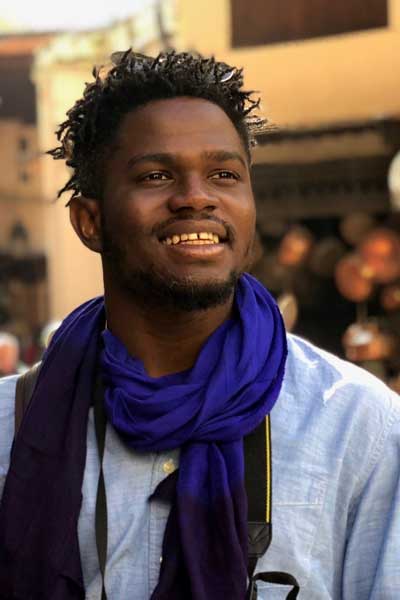
Robert Saah Nyumah
MFT Social Justice Award
The MFT Social Justice Award is given to a graduating student who has been deeply involved in clinical service, community outreach or research that is designed to advance the quality of life and/or to address injustices affecting people of diverse cultural and economic backgrounds or people oppressed based on gender identity or sexual orientation. Robert Saah Nyumah exemplifies this mission in his course work, his clinical work, and in each of the projects he embarked on. He has consistently chosen opportunities to learn about and serve communities of color. Robert completed an additional internship beyond program requirements and engaged in projects to address language barriers and access to services for non-English speakers and underserved communities. Robert has been a leader in demonstrating systemic awareness and cultural humility in his professional and personal interactions.
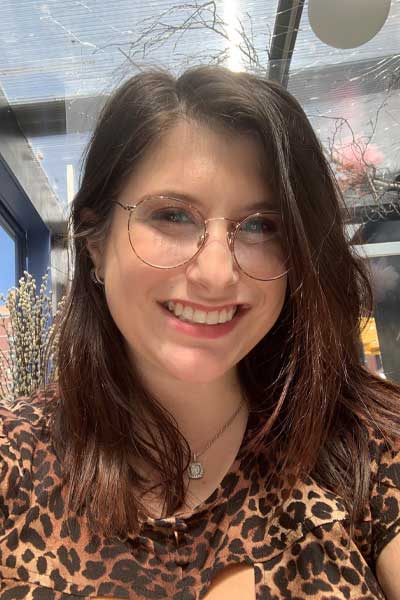
Danielle Lippman
MFT Class Marshal
The MFT Class Marshal is selected based on students’ scholarship, academic honors, department engagement, and campus/community service. This year’s MFT Class Marshal, Danielle Lippman, excelled academically, completing both her master, and certificate of advanced studies in Trauma informed practice with excellence. From the time she entered her graduate program, Danielle stood out as being generous and caring. From volunteering to help her colleagues acclimate to Syracuse, assisting the development of videos demonstrating MFT skills, mentoring incoming students, and singing the Alma Mater during the graduation ceremony, Danielle’s academic excellence and service exemplifies the spirit of the MFT Department.
Falk College welcomes new faculty and staff
Syracuse University’s Falk College is pleased to welcome four new staff members who have joined Falk College in the past academic year: Donna Fecteau, Administrative Assistant in the Department of Exercise Science; Julia Fuqua, Office Coordinator in the Department of Exercise Science; Heather Mauro, Internship Placement Coordinator in the School of Social Work, and; Melissa Tobin, Counselor, Academic Services in the Office of Student Services.
In addition, Falk College is pleased to announce the appointment of six new faculty members, Bernard Appiah, Maria Erdman, Kenneth Marfilius, Miriam Mutambudzi, Latha Ramalingam, and Maryam Yuhas, in addition to six faculty who join Falk College with the Department of Exercise Science, Tiago Barreira, Tom Brutsaert, Keith DeRuisseau, Kevin Heffernan, Joon Young Kim, and Kristen Konkol.
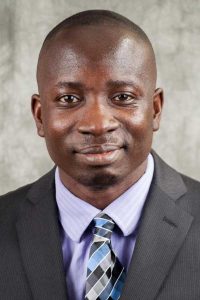 Bernard Appiah
Bernard Appiah
Assistant Professor, Department of Public Health
Bernard Appiah joins the Department of Public Health in Falk College as Assistant Professor in Fall 2020.
Prior to joining Syracuse University, Appiah was Assistant Professor at Texas A&M University’s School of Public Health in the Departments of Environmental and Occupational Health and Public Health Studies. He was the Founding Director of the Research Program on Public and International Engagement for Health. Previously, Appiah served as a Drug Information Pharmacist/Publications Manager at the National Drug Information Resource Centre (NDIRC) for the Ministry of Health in Ghana. He has taught courses such as environmental and occupational health communication, social context of population health, and comparative global health systems.
Appiah’s research interests lie in socio-behavioral approaches for exploring public health issues, global health and environmental health with emphasis on socio-behavioral change communication, public/community engagement interventions, and dissemination of information/knowledge through culturally appropriate communication channels. He is published in several journals, including Psychiatry Research, BMC Complementary Medicine and Therapies, Journal of Medical Internet Research (JMIR) mHealth and uHealth, and authored book chapters, technical reports, and many articles for mass media. He has presented at the International Workshop for Practitioners of Engagement Between Health Researchers and Schools in Kilifi, Kenya, the West African Society of Pharmacologists (WASOP) Conference in Ghana, and the Academy for Future International Leaders (AFIL) Open Session Seminar on Global Health Issues.
Appiah’s research has received support from the Wellcome Trust, UK, the Bill and Melinda Gates Foundation, Grand Challenges Canada, USAID Ghana, and Texas A&M University. Among the most recent supporters of his research is the National Heart, Lung, and Blood Institute (NHLBI) of the National Institutes of Health. Appiah is the recipient of numerous teaching and research fellowships and other honors including being named as a Carnegie African Diaspora Fellow in 2018 and 2016. He currently serves as Head of Capacity Building and Research Programmes for the Pan-African Network for Popularization of Science and Technology and Science Communication (African Gong); member of the Healthcare Safety and Quality Expert Committee of the U.S. Pharmacopeia, and; reviewer for Public Understanding of Science.
Appiah earned his Dr.PH in Health Promotion and Community Health Sciences in 2013 and his M.S. in Science and Technology Journalism from Texas A&M University’s School of Public Health and College of Veterinary Medicine & Biomedical Sciences, respectively. He earned his master’s in Development Communication from the University of the Philippines Open University (UPOU) and his B.Pharm in Pharmacy from Kwame Nkrumah University of Science and Technology (KNUST) in Ghana.
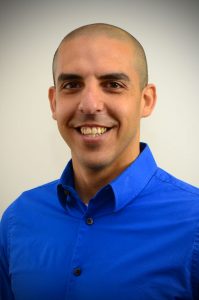
Tiago Barreira
Assistant Professor, Department of Exercise Science
Tiago Barreira joins Falk College as Assistant Professor in the Department of Exercise Science in Fall 2020. He teaches courses such as systemic physiology and exercise, research methods in exercise and sports science, measurement and evaluation in exercise science, physical activity and public health, and obesity and body composition.
Prior to joining Falk College in 2020, the Department of Exercise Science was positioned within Syracuse University’s School of Education, where Barreira has served as Assistant Professor since 2014. Barreira is also the Director of the Kinesmetrics Laboratory at Syracuse University. Prior to joining Syracuse, he completed a Postdoctoral Fellowship at the Pennington Biomedical Research Center. Barreira’s research focuses on the measurement of physical activity: establishing validity and reliability evidence of physical activity measurement tools; determining how to use physical activity measurement tools to obtain reliable and accurate information on physical activity patterns; the use of physical activity measurement tools as a motivation to promote increased physical activity levels, and; investigating the relationship between physical activity and cardiovascular disease risk factors. His work is published in several journals, most recently in International Journal of Environmental Research and Public Health, the Journal of Aging and Physical Activity, Disability and Rehabilitation, Artery Research, and the Journal of Sports Medicine and Physical Fitness among others. He has given presentations for the International Biometric Conference, The American College of Sports Medicine, and the International Conference on Ambulatory Monitoring of Physical Activity and Movement, among others.
Past research has received support from the National Institutes of Health, American Heart Association, Institute for Educational Sciences SHAPE America, Fight for Hearts, among others. Barreira is a journal editor for the Physical Activity section of Measurement in Physical Education and Exercise and is a manuscript reviewer for several journals and publications. He currently serves as Co-Chair of the Measurement and Evaluation Special Interest Group from SHAPE America and a member of the American College of Sports Medicine Mid-Atlantic Chapter Research Committee.
Barreira earned his Ph.D. in Human Performance with a concentration in Kinesmetrics in 2010 from Middle Tennessee State University, where he also earned his M.S. in Exercise Science. He also earned a B.A. Physical Education and B.S. in Business Administration from the University of North Carolina at Wilmington.
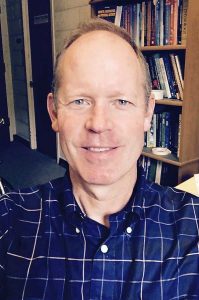 Tom Brutsaert
Tom Brutsaert
Professor, Department of Exercise Science
Tom Brutsaert joins Falk College as Professor in the Department of Exercise Science in Fall 2020. In the department, he teaches courses such as energy metabolism and exercise, physiology of exercise, environmental physiology, high altitude physiology and biology, and human biological variation.
Prior to joining Falk College in 2020, the Department of Exercise Science was positioned within Syracuse University’s School of Education, where Brutsaert has served as Professor since 2016 and previously as Associate Professor since 2009. At Syracuse, Brutsaert is the Director of the Altitude Simulation Laboratory, holds a courtesy appointment in the Department of Anthropology, and helps to coordinate the Human Performance Laboratory. Before joining Syracuse University, he held several positions at SUNY Albany. There, he was a Fellow in the Center for Social and Demographic Analysis, and was Associate Professor in the Department of Anthropology from 2005 to 2009 after being promoted from Assistant Professor. He also served as Co-Director of the Human Biology Program from 2003 to 2004. He completed an NIH Postdoctoral Fellowship at the University of California at San Diego’s School of Medicine in the Division of Physiology.
Brutsaert has broad research interests in how gene and environment interact to produce variation in human athletic ability and health and disease. His work is published in several publications, most recently in Frontiers in Genetics, Proceedings of the National Academy of Sciences of the United States of America, European Journal of Applied Physiology, the American Journal of Physical Anthropology, and International Journal of Molecular Sciences, among others. He has given presentations at the International Conference on Genomics, Leh High Altitude Symposium, World Congress on High Altitude Medicine and Physiology, for the Center for Physiological Genomics, and others.
Past research has received support from the National Science Foundation (NSF Division of Behavioral and Cognitive Sciences, National Institute of Child Health and Human Development, the National Geographic Foundation, and a Fulbright Specialist Award. Brutsaert serves on the Advisory Editorial Board for Sports Sciences for Health and the Editorial Board for High Altitude Medicine and Biology, and previously served in editorial and reviewer roles for other journals, books, and grants.
Brutsaert earned his Ph.D. in Biological Anthropology in 1977 from Cornell University, where he also earned his M.S. in Human Nutrition and M.A. in Biological Anthropology. He earned his B.A. in Biology from Northeastern University.
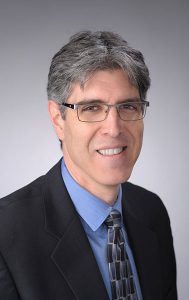 Keith DeRuisseau
Keith DeRuisseau
Associate Professor and Chair, Department of Exercise Science
Keith DeRuisseau joins Falk College as Associate Professor in the Department of Exercise Science in Fall 2020. He is currently the Chair of the department and teaches courses such as introduction to exercise science, physiology of exercise, and skeletal muscle physiology.
Prior to joining Falk College in 2020, the Department of Exercise Science was positioned within Syracuse University’s School of Education, where DeRuisseau has served as Associate Professor since 2012 and previously as Assistant Professor since 2006. Before joining Syracuse University, he was a Postdoctoral Associate in the Department of Applied Physiology and Kinesiology at the University of Florida.
DeRuisseau’s research investigates potential mediators of skeletal muscle dysfunction under conditions that include disuse, aging, and trisomy (a model of Down syndrome). An emphasis is placed on how iron, oxidants, and antioxidants contribute to skeletal muscle mass and functional responses. He is published in several journals, most recently in Applied Physiology, Nutrition, and Metabolism, the Journal of Applied Physiology, International Journal of Molecular Sciences, European Journal of Sport Science, and Respiratory Physiology & Neurobiology. He has presented his work at Experimental Biology annual meetings and for the American College of Sports Medicine.
Past research has received support from the National Institutes of Health (NIH) Eunice Kennedy Shriver National Institute of Child Health and Human Development (NICHD) and National Institute on Aging (NIA), the Diabetes Group of the Hill Collaboration on Environmental Medicine, the Syracuse University Gerontology Center, and others. DeRuisseau is a 2015-16 Fulbright U.S. Scholar Grant awardee for the Fulbright-Saastamoinen Foundation Grant in Health and Environmental Sciences. He is a member of the American Physiological Society and invited manuscript reviewer for publications such as Medicine and Science in Sports and Exercise, the International Journal of Sport Nutrition and Exercise Metabolism, and the Journal of Applied Physiology, among others.
DeRuisseau earned his Ph.D. in Movement Science from Florida State University in 2002. He earned his M.S. and B.S. in Exercise Science, both from the University of Massachusetts at Amherst.
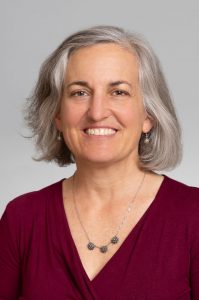 Maria Erdman
Maria Erdman
Associate Teaching Professor, Department of Nutrition and Food Studies
Maria Erdman joins the Department of Nutrition and Food Studies in Falk College as an Associate Teaching Professor in Fall 2020. At Syracuse, Erdman will teach in the nutrition program.
Prior to joining Syracuse University, Erdman was employed at Morrison Healthcare at Upstate University Hospital as a Clinical Outpatient Dietitian at the Upstate Cancer Center since 2014. Prior to that time, she was a Clinical Inpatient Dietitian. Previously, she was a Graduate Research and Teaching Assistant at Syracuse University, and also worked as a Laboratory Manager and Research Technician at UC Davis, Yale College, and Syracuse University.
Erdman’s research on nutrition on college campuses is published in Public Health Nutrition and Health Promotion. She has presented at the Food and Nutrition Conference and Exposition of the American Dietetic Association (2010) and NYSDA Annual Meeting (2009). She has given many nutrition lectures and educational sessions at Oasis/Healthlink Learning Center at Upstate Medical University, Upstate Cancer Center, Upstate Healthlink On Air Radio Program, and Upstate Medical University Physical Therapy, among others.
She is the recipient of several awards, including the Upstate Cancer Center Nutrition Services Fund, a grant from the Upstate Foundation to pay the nutrition counseling bills of cancer patients at Upstate Cancer Center, as well as the 2016 President’s Employee Recognition Award, Clinical Team of the Year. She also received the 2010 Outstanding Dietetics Student Dietetic Internship Award from the New York State Dietetic Association (NYSDA) and the Outstanding Graduate Student in Nutrition Science from Syracuse University. She has served in several volunteer positions for the CNYDA, including president, and has served in volunteer roles at the Crouse Hospital Clinical Dietetics Department, Syracuse City School District, and Community Supported Agriculture of Central New York, among others.
Erdman earned a M.S. in Nutrition Science at Syracuse University in 2009, where she also completed her Dietetic Internship, and a B.S. in Genetics at the University of California, Davis.
She earned certifications as a Board Certified Specialist in Oncology Nutrition (CSO) 2015-20 and a Board Certified Nutrition Support Clinician (CNSC) 2012-17.
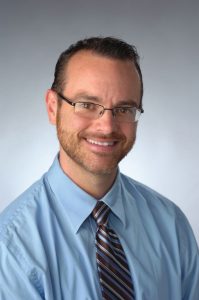 Kevin Heffernan
Kevin Heffernan
Associate Professor, Department of Exercise Science
Kevin Heffernan joins Falk College as Associate Professor in the Department of Exercise Science in Fall 2020. In the department, he teaches courses such as exercise and aging, cardiac rehabilitation, and advanced cardiovascular exercise physiology.
Prior to joining Falk College in 2020, the Department of Exercise Science was positioned within Syracuse University’s School of Education, where Heffernan has served as Dean’s (Distinguished) Associate Professor since 2011. He currently serves as the Director of the Human Performance Laboratory at Syracuse University. Previously, he completed a Post-Doctoral Fellowship at the Tufts Medical Center, Molecular Cardiology Research Institute and the Jean Mayer USDA Human Nutrition Research Center on Aging from 2008 to 2011.
Heffernan’s research examines the interaction of diet, nutritional supplementation and exercise, with an emphasis on resistance exercise, on vascular function in health, disease and disability throughout the human lifespan. His work is published in several journals, most recently the Journal of the American College of Cardiology, JAMA Cardiology, and the Journal of Applied Physiology. He has presented recent work on exercise and cardiovascular health at the American College of Sports Medicine and the North American Artery Society scientific conferences as well as work related to health disparities in cardiovascular disease risk to members of the Congressional Black Caucus. He is Past-President of the Mid-Atlantic Regional Chapter of the American College of Sports Medicine.
Past research has been funded by the American College of Sports Medicine and the American Heart Association. Current work is funded by the National Institute on Minority Health and Health Disparities, part of the National Institutes of Health. Heffernan serves on the Syracuse University Institutional Review Board, Interdisciplinary Neuroscience Faculty, is an Aging Studies Institute Research Member and a Lerner Center for Public Health Promotion Faculty Fellow.
Heffernan earned his Ph.D. in Kinesiology/Exercise Physiology from the University of Illinois at Urbana-Champaign in 2008. He holds a M.S. in Applied Physiology and Nutrition from Columbia University, and a B.S. in Exercise Science from the University of Scranton.
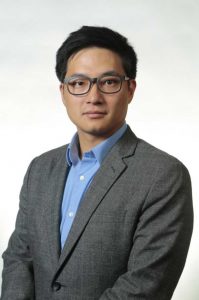 Joon Young Kim
Joon Young Kim
Assistant Professor, Department of Exercise Science
Joon Young Kim joins Falk College as an Assistant Professor in the Department of Exercise Science in Fall 2020. In the department, he teaches courses such as pediatric obesity and systemic physiology and exercise.
Prior to joining Falk College in 2020, the Department of Exercise Science was positioned within Syracuse University’s School of Education, where Kim has served as Assistant Professor since 2019. He currently leads the Clinical Research Laboratory at Syracuse University. Previously, he was a National Institutes of Health-supported T32 Postdoctoral Scholar at the University of Pittsburgh School of Medicine and Postdoctoral Associate at the UPMC Children’s Hospital of Pittsburgh from 2015 to 2019.
Kim is a Ph.D.-scientist and a clinical researcher in exercise physiology with specific focus on childhood obesity, metabolism, and type 2 diabetes. His research focuses on pathophysiology of youth-onset prediabetes/type 2 diabetes, identification of novel phenotypic biomarkers and genetic targets of obesity and type 2 diabetes, and effects of lifestyle intervention on type 2 diabetes risk in obese youth. His work is published in several high-impact journals including Diabetes Care, Diabetes, and the Journal of Clinical Endocrinology & Metabolism. He has given presentations at the American Diabetes Association, American College of Sport Medicine, Endocrine Society, and others.
Past research has been funded by the National Institute of Diabetes and Digestive and Kidney Diseases and the Arizona State University Research Support Program. He has received scholarships and awards from Yonsei University and Arizona State University, as well as the International Society for Pediatric and Adolescent Diabetes and the Endocrine Society. He currently serves as an Advising Member for the American Diabetes Association’s Exercise Physiology Interest Group Leadership Team, an Organizing/Scientific Committee Member for the World Obesity and Weight Management Congress, and an Editorial Board Member for the Journal of Obesity and Metabolic Syndrome.
Kim earned his Ph.D. in Kinesiology/Exercise Physiology from Arizona State University in 2015. He holds a B.S. in Physical Education from Yonsei University in South Korea.
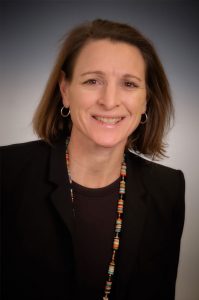 Kristen Konkol
Kristen Konkol
Assistant Teaching Professor, Department of Exercise Science
Kristin Konkol joins Falk College as an Assistant Teaching Professor in the Department of Exercise Science in Fall 2020. She has a dual appointment in the School of Education. In the department, she teaches courses such as structural kinesiology for performance enhancement and injury prevention, structural kinesiology, scientific principles of conditioning, and concepts of fitness. She also runs the internship and experience credits for the department.
Prior to joining Falk College in 2020, the Department of Exercise Science was positioned within Syracuse University’s School of Education, where Konkol has served as Assistant Professor since 2018, and formerly as part-time faculty. Previously, Konkol was an Assistant Professor in the Department of Human Performance, Exercise Science/Physiology at the Minnesota State University, Mankato, where she taught courses such as individualized exercise, aerobic conditioning, and concepts of fitness, among others. She also held an adjunct faculty position there, as well as coaching positions at the Gustavus Adolphus College. At the University of Kwa-Zulu Natal in South Africa, Konkol held several titles, including lecturer, lab instructor, manager in the Human Performance Laboratory, and performance specialist for professional athletes.
Konkol’s research interests include sport specific training; speed, agility, and quickness training; athletic performance testing; strength and conditioning; exercise immunology; and global perspectives in human performance. Konkol’s work is published in the Cardiovascular Journal of Africa, Sport Sciences for Health, Children, Sports and Exercise Medicine Open Journal, and International Journal of Exercise Science.
Konkol currently serves at Syracuse University as the I-Move Program Coordinator and Dance Minor Coordinator. From 2004 to 2006, she served as a United States Peace Corps Volunteer in Guyana and South America. Konlol is a Certified Performance Enhancement Specialist through the National Academy of Sports Medicine.
Konkol earned her Ph.D. in Sports Science from the University of KwaZulu-Natal in South Africa in 2013. She earned an M.A. in Kinesiology with an Exercise Physiology emphasis and a graduate minor in Complementary and Alternative Therapy and Healing Practices from the University of Minnesota in 2001. She earned her B.S. in Exercise Science with a Cardiac Rehabilitation emphasis from the University of Toledo, where she was a Division I collegiate basketball athlete.
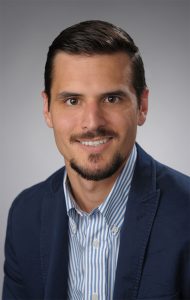 Kenneth Marfilius
Kenneth Marfilius
Assistant Teaching Professor, School of Social Work
Ken Marfilius joins the School of Social Work in Falk College as an Assistant Teaching Professor in Fall 2020.
Prior to his new appointment at Syracuse University, Marfilius served as a Visiting Teaching Professor in Falk College’s School of Social Work since 2018, and as an Adjunct Faculty Member from 2016 to 2018. Marfilius will serve as the School of Social Work’s Undergraduate Director. He has taught courses on topics such as social work intervention, military culture and social work practice, psychopathology, and others. While active duty, Marfilius served in the U.S. Air Force Biomedical Science Corps in multiple roles: active duty clinical social worker, mental health therapist, family advocacy officer in charge, and as manager of the alcohol and drug prevention and treatment program. He was commissioned in 2013 and was discharged in 2016 having obtained the rank of captain. At the Barksdale Air Force Base, Marfilius served in a variety of mental health roles related to sexual assault prevention and response, suicide prevention, and traumatic stress. Marfilius has also worked for the U.S. Department of Veteran Affairs at the Syracuse VA Medical Center in the Healthcare for Homeless Veterans Program, and as a Disruptive Behavior Committee Member.
Marfilius has given several presentations and trainings, topics ranging from veteran cultural competence to trauma-informed care, at the Association for Humanistic Counseling National Conference, the University of Pennsylvania School of Social Policy and Practice, and the United States Department of Veteran Affairs, among others.
Marfilius is honored with a National Defense Service Medal, Global War on Terrorism Service Medal, and Nuclear Deterrence Operations Service Medal. He is a recipient of the U.S. Air Force Health Professions Scholarship and the U.S. Air Force Outstanding Unit Award and has twice been awarded the Barksdale Air Force Base Medical Operations Squadron Company Grade Officer of the Quarter. Marfilius currently serves on several committees at Syracuse University, including his service as Chair of the Council on the Social Work Education Self-Study Steering Committee.
Marfilius earned a Doctorate in Clinical Social Work (D.S.W.) and Master of Social Work (M.S.W.) from the University of Pennsylvania School of Social Policy and Practice. He earned a B.A. in Psychology with a minor in Public Health from Syracuse University. He is a Licensed Clinical Social Worker in the State of North Carolina and is certified in Prolonged Exposure Therapy.
 Miriam Mutambudzi
Miriam Mutambudzi
Assistant Professor, Department of Public Health
Miriam Mutambudzi joins the Department of Public Health in Falk College as Assistant Professor in Fall 2020.
Prior to joining Syracuse University, Mutambudzi served as a Research Associate in the MRC/CSO Social and Public Health Sciences Unit at the University of Glasgow in Scotland, and a Guest Epidemiology Professor in the Department of Epidemiology and Social Medicine at the University of Antwerp in Belgium. Previously, she was an Assistant Professor in the Department of Preventive Medicine and Community Health at the University of Texas Medical Branch, and a Senior Research Program Coordinator at Johns Hopkins University’s School of Medicine.
Mutambudzi’s research focus is on chronic disease and occupational epidemiology. Much of her research has largely been directed towards the use of longitudinal data to assess disparities in morbidity, disability, and mortality, with particular interest in onset and progression of chronic diseases, work-related health outcomes, and social determinants of health in vulnerable populations and older adults in Europe and the U.S. She has published extensively in peer-reviewed journals including the European Journal of Ageing, Journal of Gerontology: Medical Science, and the Journal of Occupational and Environmental Medicine, among many others. She has presented at the International Union for the Scientific Study of Population (IUSSP), Epidemiology in Occupation Health Conference (EPICOH), and the Population Association of America (PAA).
Mutambudzi is the 2020 recipient of the Kammer Emmett Award from the American College of Occupational and Environmental Medicine (ACOEM) for the most outstanding article published in the Journal of Occupational and Environmental Medicine in 2019. Past research support includes funding from the National Institute for Occupational Safety and Health (NIOSH). She is an Editorial Board Member of the Journal of Aging and Health and has served as an editorial peer reviewer for many other journals. She is a member of the European Association for Population Studies.
Mutambudzi earned her Ph.D. in Public Health from University of Connecticut in 2012. She also holds a Master of Public Health (MPH) and a B.A. in International Studies from the West Virginia University.
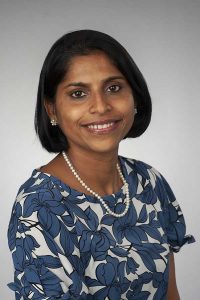 Latha Ramalingam
Latha Ramalingam
Assistant Professor, Department of Nutrition and Food Studies
Latha Ramalingam joins the Department of Nutrition and Food Studies in Falk College as Assistant Professor in Fall 2020. She works broadly in areas of metabolic disease, which include obesity and diabetes.
Prior to joining Syracuse University, Ramalingam was a Research Assistant Professor in the Department of Nutritional Sciences at Texas Tech University since 2014. Previously, she served at Indiana University’s School of Medicine as a Postdoctoral Fellow and a Research Assistant.
Ramalingam’s research interests include strategies, both in vitro and in vivo, to investigate the effects of Bioactives (omega-3 fatty acids, Vitamin D) in maternal obesity using animal models. She also has projects investigating the mechanism behind the role of Renin Angiotensin System (RAS) in beta cells. She has published in several journals, including Scientific Reports, Journal of Nutritional Biochemistry, Molecular Nutrition & Food Research, Nutrients, and Diabetes. She has presented her work at the American Society of Nutrition, American Heart Association and Obesity Society.
Ramalingam’s research has been supported by the American Heart Association, the USDA, the National Institutes of Health (NIH) National Center for Complementary and Integrative Health, the Obesity Society, and Texas Tech University. She is the recipient of several awards, including Early Career Travel Award for International Congress of Nutrition, Argentina 2017, and 2016 IJO Young Investigator Award, 13th International Congress of Obesity, Vancouver, Canada and the Early Career Grant Challenge from Obesity Society among other awards. Currently, she serves on the Editorial Board for the Journal of Nutritional Biochemistry, International Journal of Diabetes, and Obesity and Nutritional Disorders.
Ramalingam earned her Ph.D. at the Indiana University’s School of Medicine, Department of Biochemistry and Molecular Biology, in 2014. She also holds a M.Tech from Vellore Institute of Technology’s School of Biotechnology in Vellore, India and a B.Pharm from Sri Ramachandra Medical College’s School of Pharmacy in Chennai.
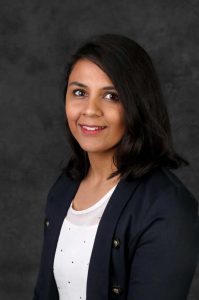 Maryam Yuhas
Maryam Yuhas
Assistant Professor, Department of Nutrition and Food Studies
Maryam Yuhas joins the Department of Nutrition and Food Studies as Assistant Professor in fall 2020. At Syracuse University, Yuhas will teach in the nutrition program.
Prior to joining Syracuse University, Yuhas served as a Postdoctoral Research Associate at the University of Virginia School of Medicine, Department of Public Health Sciences, since 2019. Previously, she has practiced as Registered Dietitian in two different clinical settings and has held roles as Graduate Research Assistant for the University of Virginia’s Department of Public Health Sciences, Virginia Tech’s Department of Human Nutrition, Foods, and Exercise, and for Oklahoma State University’s Department of Nutritional Sciences. She has also held other intern, extern, and teaching assistant roles. Yuhas’s research is rooted in the socioecological perspective and focuses on working with minority, low-income, and rural communities to implement and evaluate nutrition- and physical activity-based interventions. She is published in the Journal of the Academy of Nutrition and Dietetics, Journal of Medical Internet Research (JMIR) mHealth and uHealth, Journal of Appalachian Health, Contemporary Clinical Trials, Preventive Nutrition and Food Science, and Nutrition and Metabolic Insights. She has given scientific presentations at The Obesity Society, Experimental Biology, and the Oklahoma Academy of Nutrition and Dietetics, among others.
Current research projects for which Yuhas serves as Postdoctoral Research Associate are supported by the National Institute on Minority Health and Health Disparities of the National Institutes of Health (NIH) and by the Patient Centered Outcomes Research Institute (PCORI). Yuhas is the recipient of several awards, including the 2013 Weber Gerontology Scholarship Award at Oklahoma State University and the 2016 Interdisciplinary Graduate Education Program Award at Virginia Tech, among others. She currently serves as a reviewer for several journals including the Journal of Medical Internet Research, the Journal of the Academy of Nutrition and Dietetics, and the Journal of Adolescent Health. She is a member of the Society of Behavioral Medicine, the Academy of Nutrition and Dietetics and several community-based advisory boards and coalitions.
Yuhas earned her Ph.D. in Human Nutrition, Foods, and Exercise from Virginia Tech in 2019, specializing in Behavioral and Community Sciences. She earned her M.S. in Nutritional Sciences from Oklahoma State University and her B.S. in Nutrition and Dietetics from Benedictine University. She completed her Dietetic Internship at Oklahoma State University and earned her Registered Dietitian (RDN) credential from Commission on Dietetics Registration in 2014.
Taking Teletherapy Mainstream
Linda Stone Fish makes sure her space is clean and quiet as she places a virtual call in her small, downtown Syracuse office. Tucked away on the fourth floor of Peck Hall, the Syracuse University professor supervises doctoral students who provide free mental health services to area residents. Many of the clients, she says, are victims of poverty, violence and systemic racism.
A couple and family therapist specializing in LGBTQ issues, Stone Fish is among tens of thousands of mental health professionals in the United States adjusting to life during COVID-19, as the demand for their services climbs.
“Teletherapy is here to stay,” says the Falk Family Endowed Professor, against the hum of traffic from nearby Interstate 81. “The pandemic has forced us to integrate it into our teaching, research and practice. The opportunities outweigh the challenges.”
Stone Fish serves on the faculty of Marriage and Family Therapy (MFT), a signature department at Falk College. Home to a half-dozen graduate programs, including the nation’s first accredited MFT master’s program, the department is a leader in supervised clinical training—be it in person, virtual or both.
“Most programs focus on the individual. We, in turn, consider the psychosocial and cultural contexts of issues that come up in research and clinical practice,” says Stone Fish, who divides time between the classroom and the department’s Couple and Family Therapy Center (CFTC) in Peck Hall. “Telehealth enables us to address diversity and inclusion in new, transformative ways.”
Credit the pandemic for turning teletherapy from a nice-to-have into a must-have. In MFT, where hands-on, experiential learning permeates the curricula, technology is improving the speed and efficacy of treatment. As a result, growing numbers of millennials (ages 26-40) tend to prefer a video camera over a therapist’s stereotypical couch.
Thom deLara G’75, professor of practice and chair of MFT, is not surprised by the trend. “Telemedicine has been around for about 40 years, but only in the past five or six has it become integral to the mental health industry. COVID-19 accelerated the process,” he says.
Adds Stone Fish: “The transition was bound to happen. Luckily, the University had the people, programs and infrastructure in place to pivot to a virtual setting.”
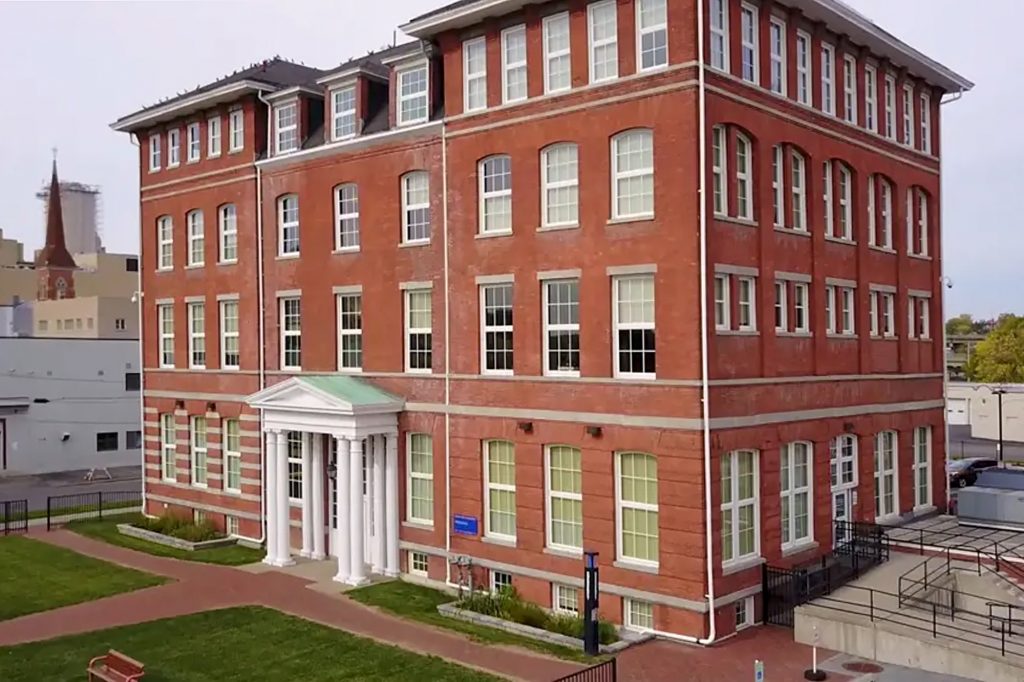
Expanding Its Urban Footprint
Jesse Truesdell Peck was a Methodist pastor who cofounded Syracuse University and served as the inaugural chair of the Board of Trustees. In 1896, he built what became known as Peck Hall on the site of a demolished carriage factory. Housing the University’s new College of Medicine, the opulent brick structure boasted, among other things, the nation’s first physiological laboratory for students.
Time was not always kind to the four-story walk-up. A series of postwar events, including SUNY’s acquisition of the College of Medicine, turned Peck Hall into an afterthought. It didn’t help that the University’s Main Campus was a half-mile away and later separated by an elevated stretch of Interstate 81.
Straddling East Genesee and McBride streets, Peck Hall eventually fell into disrepair. Tenants such as University College and the Central New York Charter School came and went before urban decay shut down the building for good in 2005.
Salvation came from an unlikely corner: MFT, a small, bustling department that wanted to consolidate its programs under one roof and expand its urban footprint. Falk’s dean, Diane Lyden Murphy ’67, G’76, G’78, G’83, teamed up with attorneys William Gilberti L’78 and Joshua Heintz L’69, both of whom purchased Peck Hall and nearby Reid Hall in 2007. Five years and $2 million later, Peck reopened as MFT’s new home. Reid Hall was retrofitted to contain the McMahon Ryan Child Advocacy Center, dedicated to ending child abuse.
Murphy notes the convenience and accessibility of MFT, touting its location in the “heart of the city” and proximity to McMahon Ryan. “Besides providing critical mental health services for individuals, couples and families, Peck Hall meets the needs of our students while supporting the research and scholarship of our faculty. Because of our location, this good work continues and benefits everyone tremendously,” she says.
According to deLara, MFT’s nearness to some of the nation’s most impoverished neighborhoods, combined with Falk’s new technologies, facilities and equipment, enables therapists to take a “progressive, collaborative and creative approach” to training and learning.
“With the shortage of mental health services, the need for properly trained clinicians is extraordinary,” says deLara, who has more than 40 years’ experience as a mental health practitioner and management consultant. “We work with children and adults who are dealing with trauma, abuse, depression and a host of other issues. There’s nothing we haven’t seen.”
That half of Americans with diagnosable mental disorders don’t have access to care is abhorrent, he adds. “We look at the world around us and figure out how to meet the needs of our students and clients.”
MFT’s launch in 1969 coincided with the emergence of behavioral couples’ therapy and behavioral family therapy. Although MFT was a one-of-a-kind program, its students initially were more interested in honing their pastoral counseling skills—a nod to one of the department’s founders—than becoming therapists.
Since then, the department has evolved into a crucible of innovation and entrepreneurship. It is home to the first and only accredited Ph.D. program in MFT in New York state and the only dual degree program in MFT and master of social work in the country. In August, MFT will offer a new online master’s degree program.
“Employment of marriage and family therapists is expected to grow more than 20 percent over the next decade,” deLara says. “These therapists will work in a variety of settings, including private practice and mental health centers. Using technology to link classrooms, counseling areas and faculty offices, we can seamlessly train the future workforce.”
He attributes the field’s popularity to several factors, including a lack of demonstrated effectiveness of traditional approaches to mental health issues, the reduced stigma associated with seeking treatment and the need for new approaches to mental health issues in context of where they exist—for instance, with one’s family, relationship, marriage, school or community.
“You also need a license to practice in any of the 50 states. Kind of legitimizes the profession, don’t you think?” deLara smiles.
Meeting the Critical Need for Services
The crown jewel of the department is CFTC, which has existed in different permutations since the early 1970s. Offering no-cost, confidential therapy services to families, couples and individuals affords the center a kind of hidden-gem status.
“We see 200-300 clients a year—the equivalent of about 7,000 visits,” says director Tracey Reichert Schimpff, who also oversees MFT’s clinical services. “Many of our therapists are graduate students, supervised by licensed faculty members. Since their work is contextual, students learn how to navigate client systems and relationships.”
CFTC’s clientele, half of whom are from low-income neighborhoods, reflect the area’s socioeconomic diversity. A majority of clients, in fact, report growing up with a high number of adverse experiences. They inevitably present with a host of problems, such as relationship difficulties, communication struggles, family violence and substance abuse.
Hence, MFT takes what Professor of Practice Dyane Watson calls a “trauma-informed, socially just, Self-in-Systems” approach. “We integrate self-understanding of students in clinical training with a systems framework for clinical work with clients,” she explains. “This approach rests on the belief that therapists’ life experiences, value systems and social locations influence what they pay attention to, the decisions they make and the way they react to families they work with. Students then become aware of themselves and the impact they have on their contexts.”
Watson boasts of CFTC’s Gender Expansive Support Team (GEST), co-led by Associate Professor Deb Coolhart G’01, G’06 and Clinical Supervisor Daran Shipman G’10. In addition to their usual caseload, GEST therapists help individuals, couples and families become more attuned to one another as they grapple with gender exploration or transition.
“I had such a diverse population of clients and classmates,” remembers Theresa Jenkins ’00, G’17, a former GEST therapist who now works for Harvest House Counseling in Syracuse. “The experience gave me the theoretical skills and knowledge I needed to become an effective therapist. It taught me the importance of being my authentic self.”
There’s also Reichert Schimpff’s Adolescent Diversion Program (ADP), a collaboration of CFTC; the City of Syracuse Adolescent Diversion Court; and the Center for Court Innovation, a nationwide nonprofit involved with criminal justice reform. Most ADP clients are 16- and 17-year-olds indicted for one or more violations or misdemeanors. “We provide services and interventions that improve their self-worth and family communication skills. It is work that’s been proven to reduce recidivism,” she adds.
Experiential Learning and Career Success
Longstanding partnerships, such as those with Liberty Resources, Vera House, The Salvation Army and Catholic Charities, underscore MFT’s mission. They also help students find jobs.
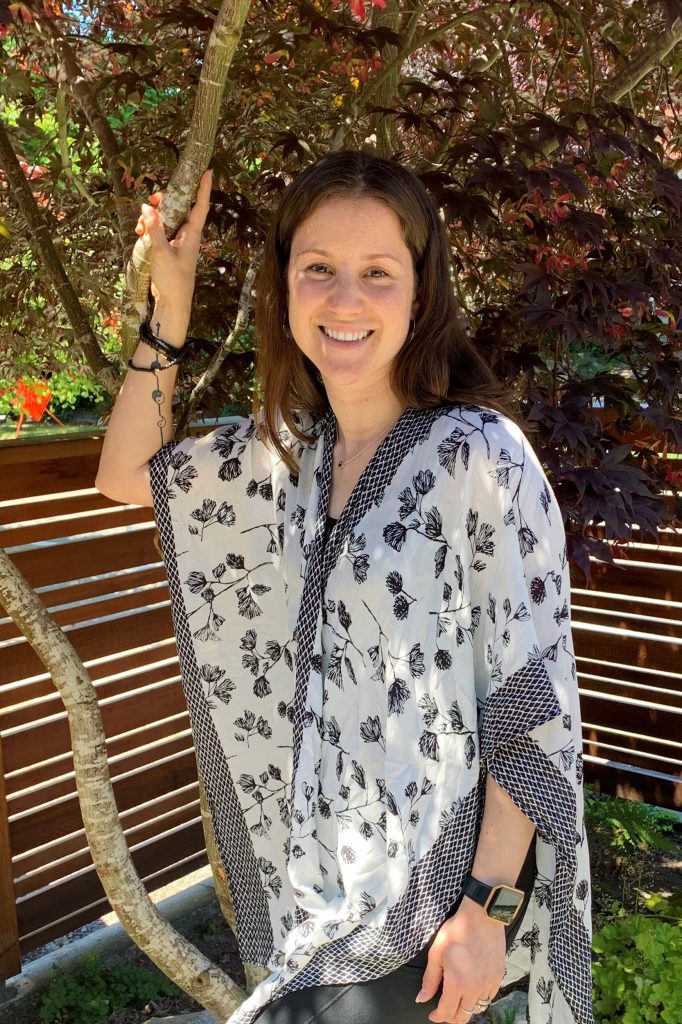
Carrie Land-Steves G’09 is one such beneficiary. Interested in trauma-informed clinical therapy, she parlayed an internship at Vera House, a local leader in domestic and sexual violence services, into a full-time gig. Today, she is the agency’s clinical program supervisor—a position she considers a “perfect fit.”
“The experiential training I got at Syracuse University became the foundation for my clinical practice,” says Land-Steves, who, like all MFT students, underwent 500 supervised clinical hours of direct client contact. “This meant being in a room with clients and getting feedback from professors in real time. Afterward, I studied videos of my sessions and reflected on how the space was shared, in terms of body language and intervention.”
Land-Steves credits MFT faculty and staff for fostering a supportive learning environment. She harbors special affection for former CFTC director Anne Gosling. “She had a very loving presence. There was no BS with her. Anne wanted us to be the best therapists and people we could be,” Land-Steves says.
Jenkins also thrived in MFT’s personable, professional setting. When asked to cite a professor who influenced her, she answers, “All of them.” “Every single faculty member took me under their wing, at one time or another,” says Jenkins, who earned certificates of advanced study in addiction studies and trauma-informed practice. “Whenever I see them, my heart melts. I was—and still am—honored to be part of this fine group of individuals.”
Understanding Lived Experiences, Serving Marginalized Communities
Some of MFT’s most salient work takes place not in an office or a classroom but on the city streets. “Some people seek help because they think their marriage or relationship is in danger. Our work is much more contextual than that,” Stone Fish says.
Committed to serving marginalized communities, Associate Professor Rashmi Gangamma oversees MFT’s refugee mental health program. She and her doctoral students collaborate with local communities to increase access to therapy services. This has included the development of a training module for spoken-language interpreters and therapy students to provide culturally responsive psychotherapy. “I have found there is a lot of strength in building collaborative efforts, rather than each person doing their own thing,” she says.
With more than 10,000 refugees resettled in Onondaga County in the past decade, mental health access is a concern to MFT faculty. Thus, the department has partnered with PEACE Inc.’s Head Start program to provide free family therapy services to low-income refugee families with young children.
“Different cultures have different ideas about treatment,” says Reichert Schimpff, noting the long-term effects of displacement on mental health. “Rashmi has spent more than five years developing relationships with our refugee neighbors. Her research is actually therapeutic.”
Cultural competence also pervades MFT’s partnership with the Street Addiction Institute Inc. (SAII). Established by Timothy “Noble” Jennings-Bey, SAII address the causes and consequences of neighborhood violence. The nonprofit offers year-round programs for at-risk youth, many of whom are victims of unaddressed trauma.
SAII grew out of project involving Jennings-Bey, founder of the locally based Trauma Response Team; Sandra Lane and Dessa Bergen-Cico ’86, G’88, G’92, professors in Falk College; and Robert A. Rubenstein, Distinguished Professor of Anthropology in the Maxwell School of Citizenship and Public Affairs. Collectively, they have authored more than a dozen articles about the social determinants of mental health.
“Noble connected street life to addiction, in an attempt to explain why young men engage in destructive criminal behavior,” says Lane, a Meredith Professor of Public Health and Anthropology. “For our clients, receiving treatment in a location that is convenient and familiar can inspire others to get help.”
Lane has developed an MFT course module that examines how various determinants, such as crime and trauma, affect the mental health of a community. For students drawing connections between systemic racism, police violence and COVID-19 health disparities, the module is timely and relevant.
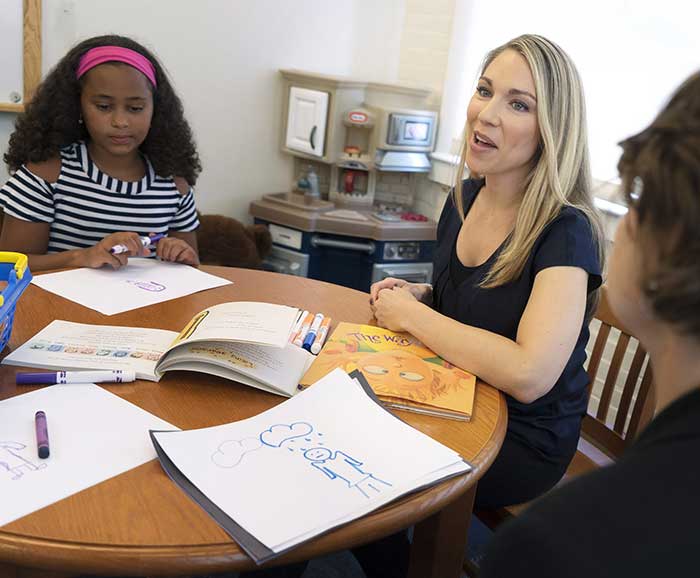
“It’s important for MFT therapists to understand the lived experiences of their clients,” Lane says. “Systemic racism, for instance, is more than a slur. It involves decisions made by people who may not even think they’re racist. The mental impact of these decisions, which affects our homes, schools, offices and courts, is only beginning to be understood.”
It’s this trauma-informed, socially just approach that sets MFT apart from other clinical training programs, according to Stone Fish. She illustrates her point by referencing an intervention created by one of her doctoral students, who runs Zoom meetings for local victims of police brutality.
“Since the pandemic hit, the University has been doing everything it can to make our community feel safe and secure,” Stone Fish says. “There’s no secret to feeling better, but with teletherapy, we provide greater access and privacy than ever before. For our own students and their clients, it may be their best option.”
~ Rob Enslin
A Syracuse University Story first published on July 21, 2020.
Department of Marriage and Family Therapy offers on-going programming, safe spaces to discuss recent racial injustice
Recent events of unprovoked killings of Black people have understandably reinforced feelings of fear, anger, and systemic and racially-motivated injustice in our communities. The deaths of Breonna Taylor in Louisville, KY, Tony McDade in Tallahassee, FL, and George Floyd in Minneapolis, MN, mirror countless previous incidents where police officers have seriously injured, used unnecessary force, or killed unarmed Black people. This systemic violence has continued recently with law enforcement’s brutality against peaceful protesters all over the country. We recognize these incidents and images on social media and news highlighting ongoing violence may trigger significant emotional distress.
If you or someone you know could benefit from participating in a group listening circle via Zoom with a Syracuse University Doctoral student in Marriage and Family Therapy to discuss these tragic events, please email Dominique Walker at dnwalker@syr.edu. The listening circle will take place on Wednesday, June 3rd 3:00-4:00. In making your decision to participate, we understand that it may be important to know the facilitator’s social location in relation to these incidents. For this reason, Dominique identifies as a member of the Black community.
If you or someone you know could benefit from participating in a one-on-one supportive Zoom conversation with a licensed Marriage and Family Therapist to discuss these tragic events, please email Deb Coolhart at dcoole@syr.edu or Lisa Tedeschi at lmtedesc@syr.edu. In making your decision to seek this support, we understand that it may be important to know the therapist’s social location in relation to these incidents. For this reason, Deb Lisa identify as White allies.
The Falk College community stands united with Syracuse University in educating against the ideas of hate and terror that support and maintain systemic racism and social injustices throughout our society. “Falk College is built on the values of social justice. I look to our Falk family—students, alumni, faculty, staff, and friends—to be educated, be brave, and be active. I ask you to engage both your professional skills as advocates, as well as your humanity and personal values, at this time and at all times, to ensure the dignity of all,” says Diane Lyden Murphy, Dean, Falk College. “It is critical for us to support one another in the efforts to combat monumental injustices and continued racism experienced by persons of color in America and around the world.”
Ongoing Group Listening Circles for Discussing Racial Injustice
June 25th 12 pm – 1 pm and July 16th 12 pm – 1 pm.
This Group Listening Circle is for Students of all racial and ethnic identities. This group will provide a space to discuss and process some of the recent as well as historical events of racial injustice in the U.S. Facilitators are Dominique Walker, M.A. (Ph.D. Student in MFT) and Shaelise Tor, M.S. (Ph.D. Candidate in MFT). Group Listening Circle will be held via Zoom. Please email Shaelise for log in information.
Every other Tuesday starting June 30th from 3 pm to 4 pm
This Group Listening Circle is for Students who identify as part of the Black community. This group will provide a space to discuss and process some of the recent as well as historical events of racial injustice in the U.S. and the personal effects on you and your community. Facilitated by Dominique Walker, M.A. (Ph.D. Student in MFT). Group Listen Circle will be held via Zoom. Please email Dominique for log in information.
Congratulations Class of 2020
Congratulations and best wishes to the Class of 2020 from the students, faculty, staff, advisory boards, alumni and friends of Falk College! The courage and resiliency you have demonstrated in these challenging times prove you are prepared to respond to society’s greatest needs. Now more than ever, our world needs all you have to offer. We look forward to hearing about your achievements as our newest Falk alumni and eagerly await the future in-person celebration at Falk Convocation and Syracuse University Commencement.
The Dean’s video message to the Class of 2020 was recorded late last year when we were fully expecting our traditional campus celebrations to take place this spring. Since then, the global coronavirus pandemic has impacted all of us in many difficult ways. We recognize how hard this has been for all of our students, and particularly the Class of 2020. While we will celebrate with you at distance for now, we look forward to celebrating together in person when it is safe to do so.
Join the Syracuse University community for the Class of 2020 Virtual Degree Conferral.
Page 8 of 16
